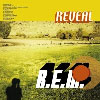R.E.M. : REVEAL
- The Lifting
- I've Been High
- All the Way to Reno (You're Gonna Be a Star)
- She Just Wants to Be
- Disappear
- Saturn Return
- Beat a Drum
- Imitation of Life
- Summer Turns to High
- Chorus and the Ring
- I'll Take the Rain
- Beachball
Label : Warner Bros.
Release Year : 2001
Length : 53:36
Review (AllMusic) : Give 'em credit for realizing that Up was a dead end, an avenue paved with forced experimentalism that signified nothing. Dock them points for harboring the desire to wander down that path, choosing to indulge in fuzzy details that add texture but not character. These two impulses balance each other as R.E.M. delivered Reveal, an album that feels like their stab at All That You Can't Leave Behind - a conscious return to their classic sound. Since they're fiercely protective of their anointed position of underground pioneers, they're not content to sit still and spin their wheels, turning out a record that apes Automatic for the People. So, they return to the lushness of Out of Time, melding it with the song-oriented Automatic - and undercutting it all with the sober sonic trickery of Up and New Adventures in Hi-Fi. Because Reveal is song-oriented, it initially plays more accessibly than Up, but these songs are cloaked in the same kind of deliberate studiocraft that made Up feel stilted. It's not as overt, of course - the drum machines and loops have taken a backseat - but it's still possible to hear the clipped Pro Tools effects on "Summer Turns to High," for instance, and most tracks are a little fussy in their aural coloring. This prevents Reveal from being an album to wholeheartedly embrace, even if it attempts to be as rich as Automatic and even if it succeeds on occasion. There are some very good pop songs here - windswept and sun-bleached beauties like "Imitation of Life," the dusty "All the Way to Reno (You're Gonna Be a Star)," and "Beachball," the one time their Beach Boys obsessions click. Still, none of these moments shine as brilliantly as the best moments of New Adventures and ultimately they're weighed down by the album's aesthetic, which emphasizes sonic construction over the songs. This is mood music, not music that creates a mood, which becomes evident as the record stagnates during its second half. Reveal winds up sharing the same strangely distant feel of Up, even if it's a tighter, better record. When R.E.M. weren't trying as hard, when they weren't meticulously crafting their sound, they made records that were as moody, evocative, and bracing as Reveal intends to be. Here, it's just all a bit too studied to ring true.
